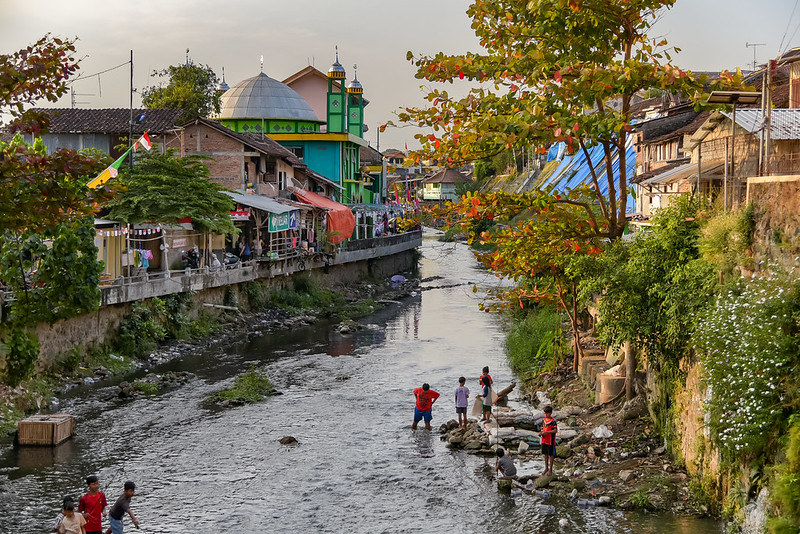Water and Sanitation in Indonesia
 Indonesia is renowned for its stunning landscapes, vibrant culture and warm hospitality, which draws millions of visitors annually. However, beyond its scenic allure lies a pressing challenge: inadequate access to clean water and sanitation. This issue severely impacts public health and disproportionately affects impoverished communities, where limited resources hinder access to essential health care services. Tackling this crisis is critical to breaking Indonesia’s cycle of poverty and fostering sustainable development.
Indonesia is renowned for its stunning landscapes, vibrant culture and warm hospitality, which draws millions of visitors annually. However, beyond its scenic allure lies a pressing challenge: inadequate access to clean water and sanitation. This issue severely impacts public health and disproportionately affects impoverished communities, where limited resources hinder access to essential health care services. Tackling this crisis is critical to breaking Indonesia’s cycle of poverty and fostering sustainable development.
Poverty and Indonesia’s Water and Sanitation Crisis
In Indonesia, where 9.4% of the population lives below the poverty line, approximately 192 million people lack access to safe water and 14 million do not have access to safe toilets. UNICEF report reveals that nearly 25 million Indonesians practice open defecation and 89% of water sources are contaminated by faecal bacteria. Shockingly, only 7% of wastewater is treated.
This improper disposal and untreated sewage worsen water pollution, leading to unsafe water consumption. Exacerbated by poverty, these factors create a breeding ground for waterborne diseases like diarrhoea and cholera. For children, unsafe water and poor sanitation lead to chronic illnesses and stunt growth. Regarding this, 21 out of every 1,000 children in Indonesia die before their fifth birthday, according to the Asian Development Bank (ADB).
The water and sanitation crisis in Indonesia is not only a public health issue but also an environmental one. Improper waste disposal leads to severe pollution of rivers and lakes, many of which serve as primary water sources for local communities. Regarding this, four of Indonesia’s rivers, Brantas, Ciliwung, Citarum and Progo, rank among the 20 most polluted rivers in the world. This widespread pollution undermines biodiversity and poses a significant threat to agricultural productivity, further exacerbating the challenges faced by local communities.
International Help
Addressing these issues requires investment in infrastructure such as wastewater treatment facilities and clean water distribution systems. Several NGOs are working to address the root causes of poor sanitation and improve access to clean water in Indonesia.
Since 2014, Water.org has empowered more than 5.1 million Indonesians access to safe water and sanitation through innovative partnerships and financing solutions, according to its website. Its WaterCredit initiative collaborates with local financial institutions and community organizations to expand water and sanitation infrastructure. Water.org also strengthens local water utilities, offering technical assistance and cost-efficient solutions to expand sustainable services. These initiatives not only improve health and hygiene but also support Indonesia’s broader economic and developmental goals.
Indonesia and the UAE have partnered to address the pollution in Indonesia rivers, formalizing the agreement through Clean Rivers and the United Nations Development Programme (UNDP). Over the next three years, the initiative aims to clean up 5,000 tons of waste from five river areas, this project aims to prevent waste leaks into the ocean and promote sustainable water management practices. It also supports Indonesia’s goals to reduce marine waste by 70% by 2025 through collaboration with local governments and environmental organizations.
Additionally, the U.N. has facilitated $1.7 billion in financing for the Sustainable Development Goals (SDGs), including Goal 6, which ensures access to clean water and sanitation in Indonesia. This support plays a crucial role in advancing water and sanitation efforts across the country.
A Call to Action
Addressing water and sanitation in Indonesia is not just a public health issue, it is a path to breaking the cycle of poverty and unlocking the country’s full potential. Expanding wastewater treatment facilities, improving access to clean water and addressing open defecation are critical steps.
“We must ensure the U.N.’s collaboration with Indonesia continually promotes responsive and resilient policies and initiatives in the face of global crises,” says Suharso Monoarfa, Minister of National Development Planning and Head of Bappenas. Therefore, supporting organizations that improve water quality and sanitation infrastructure in Indonesia can ensure a healthier and safer future for its people.
– Nour Mostafa
Nour is based in Gloucester, UK and focuses on Good Newsand Global Health for The Borgen Project.
Photo: Flickr
